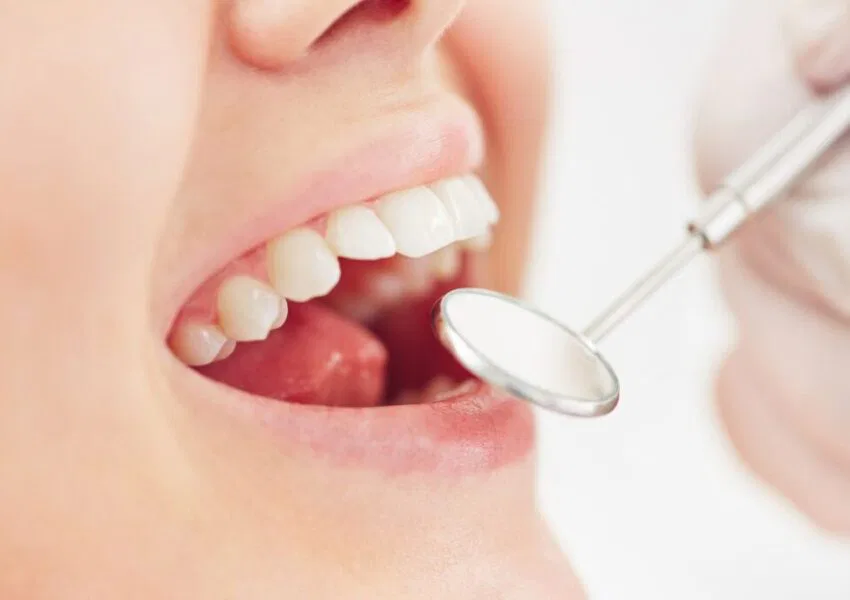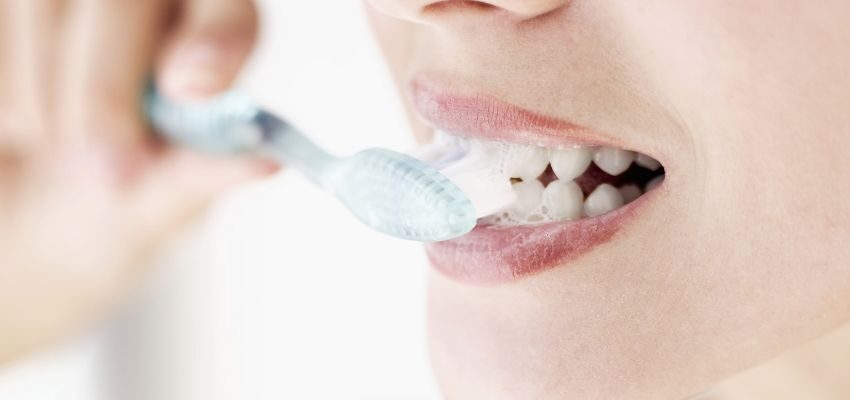Gray Tongue Explained: Causes, Symptoms, and Solutions

Published April 16, 2025
Did you know your tongue can reveal important clues about your health? More than just an organ for tasting, its color, texture, and appearance can signal potential issues. One condition that often raises questions and concerns is a gray tongue. What causes this unusual discoloration, and is it something to worry about? Let’s uncover the answers and how you can prevent it.
In this article, we’ll explore the causes of a gray tongue, signs that may indicate a need for concern, and actionable tips to promote optimal oral health.
What Is A Gray Tongue?
A healthy tongue is usually pink with a light, natural coating. It reflects a well-balanced oral environment. In contrast, a gray tongue appears dull and discolored. Depending on the root cause, its surface may seem patchy, coated, or inflamed.
The Importance Of Tongue Color For Your Health
Your tongue’s color can serve as a window into your overall health. Small changes, like a grayish hue, can signal underlying issues. These may include nutritional deficiencies, infections, or digestive problems. Noticing these shifts early can help identify health concerns.
Signs To Watch For In Tongue Discoloration
Certain foods or beverages can cause temporary discoloration. However, a gray tongue lasting over two weeks may indicate a serious problem. If you notice pain, swelling, or a foul odor, immediately see a healthcare professional.

Common Causes Of Gray Tongue
Gray tongues can result from various causes, each with contributing factors. Below, we explore some of the most frequent reasons behind this condition.
Poor Oral Hygiene
Failing to maintain proper oral care can cause bacteria buildup, leading to a grayish coating on the tongue. This occurs when plaque, food particles, and dead cells accumulate over time. Regular brushing, flossing, and tongue cleaning are vital for a healthy and clean mouth.
Dehydration And Dry Mouth
Poor hydration can result in a dry mouth, which reduces saliva production. With inadequate saliva to cleanse the mouth, bacteria and dead cells can accumulate, often causing the tongue to appear gray or coated.
Smoking And Tobacco Use
Smoking doesn’t just stain your teeth. It also affects your tongue. Regular tobacco use can cause discoloration and irritation, often resulting in a grayish tone over time.
Oral Thrush
Oral thrush, a fungal infection due to an overgrowth of Candida in the mouth, often appears as a white or gray coating on the tongue. This condition is more likely among people with weakened immune systems, usually affecting those with diabetes, and can also occur in people taking antibiotics.
Oral probiotics like Bionaze can be a valuable option for helping restore a healthy oral microbiome. It contains Streptococcus salivarius K12 (BLIS K12), which helps maintain a balanced oral environment and may also help prevent yeast overgrowth, like thrush.
Reaction To Medications Or Mouthwash
Certain medications, bismuth-containing drugs like Pepto-Bismol, or strong antiseptic mouthwashes can make the tongue look gray or discolored. Bismuth subsalicylate reacts with sulfur in saliva, creating a dark coating on the tongue.
Medications like antihistamines, antidepressants, blood pressure drugs, and diuretics can cause dry mouth. This reduces saliva flow, allowing bacteria and debris to build up, often resulting in a gray coating. Antiseptic mouthwashes, especially those with chlorhexidine, can disrupt the natural bacterial balance and lead to discoloration.
Vitamin Deficiencies
A deficiency in key nutrients, particularly vitamin B12 or iron, can impact tongue color, often causing it to appear pale or grayish. These deficiencies usually come with other symptoms. Persistent fatigue is a common sign. This highlights the need for proper nutritional support.
Leukoplakia
It’s characterized by dense, white, or gray patches on the tongue or the inner lining of the mouth. Often linked to irritants like smoking or chewing tobacco, it’s usually harmless. However, in some cases, it may progress to oral cancer, highlighting the importance of early evaluation and diagnosis.
Geographic Tongue
Also called benign migratory glossitis, geographic tongue causes smooth, grayish patches on the tongue with irregular borders. These patches can change location over time, creating a “map-like” appearance. Although generally harmless, geographic tongue may cause sensitivity to certain foods.
Oral Lichen Planus
Oral lichen planus is an inflammatory ailment that impacts the mucous membranes of the mouth. It often appears as white or gray patches on the tongue and may be accompanied by discomfort or a burning sensation. While its exact cause remains unknown, it’s thought to stem from an immune system reaction.

Preventing And Treating A Gray Tongue
The good news? A gray tongue is often manageable with proper oral care and healthy lifestyle habits. Here’s what you can do:
Improve Daily Oral Hygiene Practices
For optimal oral hygiene, brush your teeth and tongue twice a day with a toothbrush with soft bristles. Include flossing in your daily routine. Utilize a tongue scraper to remove debris and bacteria.
Stay Properly Hydrated
Drink plenty of water to keep your mouth hydrated and maintain oral health. Staying well-hydrated helps wash away food particles and bacteria while promoting saliva production, your mouth’s natural cleanser.
Limit Tobacco And Alcohol Use
Eliminating smoking and cutting down on alcohol consumption can significantly reduce tongue irritation and discoloration. Beyond improving oral health, these changes also contribute to better overall well-being.
Stay Up To Date With Dental Checkups And Cleanings
Routine dental visits are essential for catching and treating potential issues early. Additionally, professional cleanings eliminate stubborn plaque and bacteria, helping to prevent discoloration and maintain a healthy smile.
Address Underlying Health Conditions
Identify and manage any health issues causing a gray tongue, such as gastroesophageal reflux disease (GERD), inflammatory bowel disease (IBD), or fungal infections. Consult a healthcare provider to create a customized treatment plan for your comprehensive care.
Follow Prescribed Antifungal Or Antibacterial Treatments
Following your prescribed treatment plan carefully is crucial if a fungal or bacterial infection causes your gray tongue. This might involve antifungal medications or specialized mouthwashes. To ensure the best results, complete the full course of treatment as directed.
Prioritize A Nutrient-Rich, Balanced Diet
Ensure your diet includes a selection of vegetables, fruits, and lean proteins to support optimal health and prevent vitamin deficiencies. Consult your doctor about incorporating supplements to fill any nutritional gaps if needed.
Support Your Oral Microbiome Naturally
The balance of beneficial and detrimental bacteria is crucial for oral health. Stress, diet, antibiotics, or illness can disrupt this balance, leading to issues like bad breath or a gray tongue. Using an oral probiotic like Bionaze can help. It restores microbial balance and supports those prone to infections or inflammation.
When To Seek Medical Advice
- Symptoms that demand immediate attention. Seek medical care if you notice patches, swelling, or pain in your mouth. Difficulty swallowing or experiencing bleeding are both signs that require prompt action. These symptoms could signal underlying issues that require proper diagnosis and treatment.
- What to expect during diagnosis. A healthcare provider will carry out a physical exam. If further investigation is needed, they may recommend tests such as biopsies or bloodwork to identify the cause of the issue.
- Specialists for comprehensive oral health care. You may be referred to a specialist for tailored care, depending on the diagnosis. This could include a dentist, oral surgeon, or even a gastroenterologist or nutritionist, depending on the nature of the problem.
Frequently Asked Questions
Is a gray tongue contagious?
No, a gray tongue is not contagious. However, if an infection like oral thrush causes it, it could spread. This is especially true for persons with weakened immune systems.
Can a gray tongue be a sign of cancer?
Gray discoloration is not typically associated with cancer, but persistent patches could signal precancerous changes. This is especially true for conditions like leukoplakia. If abnormalities persist, it’s essential to consult a doctor.
How long does it take for a gray tongue to clear up?
The recovery time depends on the cause. If it’s due to poor oral hygiene or dehydration, the discoloration may fade within a few days once addressed. However, medical conditions may require more time and specific treatment to resolve.
Should I see a doctor or dentist for a gray tongue?
Yes, seek professional advice if symptoms last more than two weeks. Do the same if there’s pain, swelling, or signs of infection or illness.
Can certain foods cause a gray coating on the tongue?
Foods with dark pigments or artificial dyes can temporarily stain the tongue. Additionally, acidic or spicy foods may irritate the tongue, contributing to discoloration.
Why Choose Bionaze?
An imbalance in the oral microbiome often causes a gray tongue. This can be triggered by factors such as antibiotic use, inadequate oral hygiene, or fungal overgrowth. Bionaze is an oral probiotic designed to restore balance. It contains Streptococcus salivarius K12 (BLIS K12) and Bifidobacterium Lactis (BL-04), two clinically proven strains. These strains support healthy bacteria in the mouth and upper respiratory tract. Bionaze helps prevent harmful bacterial and fungal buildup. It’s an easy way to maintain oral health and reduce the risk of gray tongue.

Take Charge Of Your Oral Health And Say Goodbye To Gray Tongue
Gray tongue can be caused by poor oral hygiene, dehydration, or nutritional deficiencies. It may also signal underlying health issues. Thankfully, most causes are manageable. Regular oral care, a nutrient-rich diet, and staying hydrated can help. Changes in your tongue’s appearance can reveal important clues about your health. Noticing these early can prevent more significant problems.
To support a healthy oral environment, try an oral probiotic like Bionaze. It’s beneficial after antibiotics, illness, or recurring infections. Integrating it into your daily routine can help maintain balance and prevent future issues.
Benefit From The Latest Advancements In Probiotic Science With Bionaze
Bionaze is a proprietary blend of probiotics proven to promote ear, nose, and throat health, improve digestion, and support your immune system. The active ingredients BLIS K12, and BL-04 are considered among the best probiotics according to science.
Get 25% Off Your First Order when you use BIO25 at checkout!

This Content Has Been Reviewed For Factual Accuracy
This content has undergone thorough fact-checking by our team of internal experts. Learn more about the meticulous editorial standard for our website here.
ADVERTISEMENT

About The Author
Hi, I’m Corinne Grace, a proud nursing graduate from Riverside College with a flair for writing. I specialize in health and wellness topics, using my educational background to weave informative and attention-grabbing articles that appeal to a wide variety of readers.




